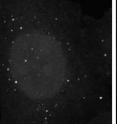Protein may advance Parkinson's by preventing neurons from clearing debris
Related images
(click to enlarge)
A protein linked to Parkinson's disease may cause neurodegeneration by inhibiting autophagy—the process in which cells digest some of their contents—according to a study in the September 20 issue of the Journal of Cell Biology (www.jcb.org). Autophagy serves to clear a variety of toxic waste from cells, including misfolded proteins and defective mitochondria. These two types of cellular trash accumulate in neurons from Parkinson's patients, suggesting that autophagy could be impaired in these cells. A commonly amassed protein in Parkinson's disease is alpha-synuclein, whose gene is often mutated or overexpressed in familial forms of the illness. David Rubinsztein and researchers from the University of Cambridge in England found that excess alpha-synuclein inhibits autophagy by blocking formation of the autophagosome—the double-membraned vesicle that engulfs cytoplasmic garbage and delivers it to lysosomes for destruction.
Previous research revealed that alpha-synuclein inhibits Rab1a, a small GTPase that controls secretory transport from the Endoplasmic Reticulum to the Golgi. Rubinsztein and colleagues now provide new insight into the role Rab1a plays in autophagy, and why blocking it has such dire consequences. The team found that lack of Rab1a impaired autophagosome formation, whereas an abundance of the GTPase reversed the inhibitory effects of alpha-synuclein on autophagy. Rab1a and alpha-synuclein act specifically at an early stage of autophagosome formation: an abundance of alpha-synuclein or lack of Rab1a disrupted an early acting part of the autophagy machinery called Atg9 and blocked the formation of autophagosome precursors known as omegasomes.
Alpha-synuclein's blockade of autophagy could enhance the gradual accumulation of toxic proteins and dysfunctional mitochondria, sensitizing neurons to cell death.
Source: Rockefeller University Press
Other sources
- Protein may advance Parkinson's by preventing neurons from clearing debrisfrom PhysorgMon, 20 Sep 2010, 17:49:09 UTC
